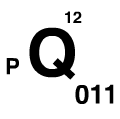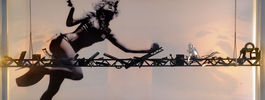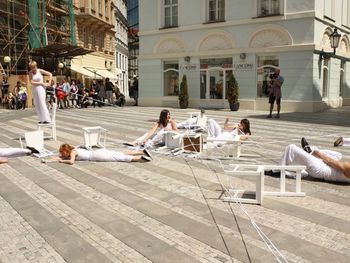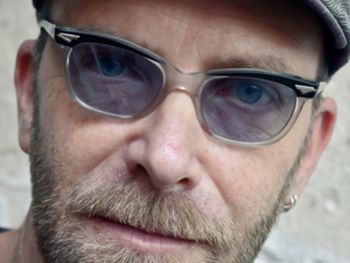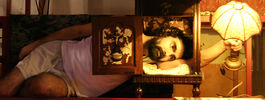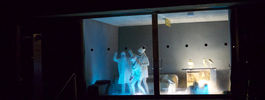We live in a world of continuous warfare fabricated to increase profit. Ideas such as equality, the right to health care or education exist only in academic papers and in the Occupy movements. Everything else is a constant race for possession: money, material goods, people. Politics has become a business, devoid of all ideological meaning. In this world, the greatest resistance is to be free. Freedom doesn’t lie in ownership. Freedom is the power to disagree. To leave. To speak up. Freedom is a political choice. If you adopt Brecht’s thesis that those who identify themselves as apolitical actually agree on the policies that are implemented over them, then every decision is political, as is artistic performance. Art is a medium of operation. Faced with the significance of art in the 1960s, when it had specific social importance, politics appropriated it by moving it into the field of “freedom”, separating it from other areas of life, creating the belief that freedom from responsibility and consequences would also mean freedom from interference. Today, however, even this minimal freedom is no longer politically acceptable, paradoxically renewing the influence of art on life. This is why the Serbian participation in the 2015 Prague Quadrennial explores the theoretical and practical meaning of politics, as well as its processes.
The Serbian national exhibition at the 2015 Prague Quadrennial is inspired by the position and importance of politics in contemporary society, the relationship that politics establishes to art and culture, and the processes created within this context. The terms are considered in their broadest sense within the context of contemporary art and culture (primarily in theatre and performing arts). The exposition also explores the policies and processes that define the social, political, economic and ideological character of today’s world, and particularly Serbia.
Kafka’s House was consciously selected as the exhibition space, in accordance with the metaphors that he and his work signify today, further complicating the meaning of what will be displayed, performed and exhibited. The artists selected will find themselves out of place; in front of observers, passers-by, an audience, relocated from their personal space. They will rely on each other while working in Kafka’s House – in a public space, before security cameras. The artists will have to learn from each other while attempting to change policies through artistic processes. They will have to examine personal boundaries and reinforce each other. To make art that concerns us. To change a world that does not concern us.
- Tijana Đuričić (Tijana Djuricic)
* 1983, Belgrade
Specialization: art manager, theatre theoretician, journalist, teacher, media artist, sound artist, Theory of Media and Arts, Opera Singing
Education: PhD, Theory of Arts and Media; master’s degree in opera singing; master’s degree in mass media; master’s degree in journalism
Collaboration with theatres: National Theatre Belgrade, Joakim Vujic Kragujevac Theatre, National Theatre Sombor
Teaching activities: Nova Academy, European University Belgrade; Faculty of Technical Sciences, University of Novi Sad
Additional information: Soprano, media theorist, journalist and cultural manager; over 150 group and solo concerts worldwide; experiments in the field of body-space-voice; assistant professor at Nova Akademija Umetnosti, Belgrade.
Exhibiting works
-
: “Clothes does (not) make the (wo)man” better (“Clothes does (not) make the (wo)man” better),
0 ;
Comments: It is said that clothes do not make a man, but we are all actually being evaluated based on looks. What happens when our clothes speak? Unspoken words and inhibited emotions (anger, joy, sadness, fear, love) speak out when we get dressed. Based on the practices of J. Cage and B. Maubrey, the work deals with the issue of identity through sound.
- Ivana Knez
* 1974, Zagreb, Croatia
Specialization: architect, teacher, set designer, scenographer, Exibition Design
Education: Master’s degree in architecture, University of Zagreb, Faculty of Architecture, Ph.D. in stage design, University of Belgrade; Ph.D. in interdisciplinary studies/stage design
Collaboration with theatres: Croatian National Theatre, Zagreb
Teaching activities: Lecturer in scenography at University of Zagreb, Faculty of Architecture, School of design (since 2014)
Continuing collaboration with directors: Anja Maksić Japundžić
Awards: Best Scenography at the Yugoslav theatre festival “No translations”, Užice, Serbia, 2013
Additional information: Diaprojektor is an architectural studio founded by Ana Martina Bakić (Zagreb, 1974) and Ivana Knez; fields of action: architecture, interior design, exhibition design and scenography; authors of many installed objects and theatrical sceneries.
Exhibiting works
-
: Zajednički prostor - prostor pregovora (Shared Space - Space of Negotiations),
0 ;
Comments: The most intriguing moment in the process of designing the theatre set is when one bare thought of the stage engages in dialogue with other actors in the play. A common space is then established – a shared space – a space of negotiations, potential, relations, politics, conflicts of interests, when the absolute author no longer exists.
- Sinisa Ilic (Siniša Ilić)
* 1977
Specialization: author, set designer, scenographer, visual artist, Visual artist and performer
Education: BA and MA in painting, Faculty of Fine Arts in Belgrade
Collaboration with theatres: Centre for Cultural Decontamination since 2001. “Duško Radović” Little Theatre since 2003. National Theatre Belgrade since 2009.
Participation in other important exhibitions: No Ifs. No Buts, DEPO, Istanbul; Aftermath, Salon of MSUB, Belgrade; Dear Countrymen and Woman, Gallery MC, New York City; Salon of Revolution, HDLU, Zagreb; Beyond Theory, WUK, Vienna and SUSHI Gallery, San Diego; Dokumenta 12 Magazines projects
Continuing collaboration with directors: Bojan Đorđev, Ivica Buljan, Ksenija Krnajski, Đurđa Tešić
Awards: Artist in residence: Akademie Schloss Solitude, Stuttgart; Kultur Kontakt, Vienna; ISCP, New York
Additional information: He is based in Belgrade. An artist and performer, he deconstructs violence (from heteronormative to nationalist) and is a connector between different spaces within the realm of culture, art and activism. He is interested in conceptualising the possibility of rethinking financial capitalism and its financialization processes permeating art and social, political and critical discourse. This reveals the process of the continuous re-articulation of our own position in the world in which we live and work. His artistic work has been always strongly oriented towards team or group work, whether collaborative work or artistic projects (collaborations with writers and theoreticians in visual art projects and comics, people from theatre and performance fields). He is a co-founder and member of TkH (Walking Theory), an independent performance art and theory platform in Belgrade, and of TkH magazine.
More about his work:
http://sinisailic.blogspot.com/
http://sinisailic.wordpress.com/
Exhibiting works
-
: Prostor neposlušan nadgledanju (Space disobedient to monitoring),
0 ;
Comments: Space and time are full of material and semiotic information that is almost impossible to perceive because it has reached the saturation point. Even if the viewer could see it “all”, he has neither the time nor the capacity to process such heterogeneous data, signals, or the false or true traces and trajectories of the accumulated material.
- Draško Adžić (Drasko Adzic)
* 1979, Belgrade
Specialization: composer, teacher, pianist, singer, performer
Education: MA in composition and orchestration; Ph.D. candidate in composition and orchestration
Collaboration with theatres: Bitef Theatre since 2011, Kamerni teatar 55 since 2012
Teaching activities: Faculty of Music in Belgrade, teaching assistant in composition and orchestration since 2014
Continuing collaboration with directors: Selma Spahić, Marta Popivoda, Anđelka Nikolić, Andrej Nosov
Awards: 1st International Convention for Conductors and Composers (Ghent, 2008); shortlisted for the Gaudeamus Prize (Amsterdam, 2009), Sterija Prize for best original theatre music (Novi Sad, 2012)
Additional information: He is a composer who has written the music for a number of plays, short documentary and feature films, television programmes, exhibitions and performances; he is the winner of several awards, including the Sterijino Pozorje Prize for original music.
Exhibiting works
-
: Institucija (Institution),
0 ;
Comments: What is the role of the Church in liberal capitalism? The audience represents the performer and the viewer just as in the religious context of the institution of temple/church. Church visitors perform a ritual practice in a “Holy Temple”, with their behaviour revealing their attitudes towards a particular canonized context.
- Darinka Mihajoivic
* 1988, Aleksandrovac
Specialization: set designer, costume designer, scenographer, scenograf
Additional information: She is a costume designer who has made costumes for several plays and movies and has participated in several group exhibitions and workshops at home and abroad. He is a recipient of Aleksandar Tomašević Award.
Exhibiting works
-
: Institucija (Institution),
0 ;
Comments: What is the role of the Church in liberal capitalism? The audience represents the performer and the viewer just as in the religious context of the institution of temple/church. Church visitors perform a ritual practice in a “Holy Temple”, with their behaviour revealing their attitudes towards a particular canonized context.
- Oliver Frljić
* 1976, Travnik
Specialization: director, author, theatre director, set designer, scenographer
Education: University of Zagreb, Academy of Dramatic Arts
Collaboration with theatres: Zagreb Youth Theatre; Croatian National Theatre Rijeka; Atelje 212, Belgrade; Mladinsko Theatre, Ljubljana, Slovenia.
Additional information: One of the most prominent theatre directors in Croatia and the former Yugoslavia, Frljić is known for his talent in dealing with the most sublime performance issues and most sensitive social problems, which he addresses profoundly and remorselessly.
Exhibiting works
-
: Izdajica (The Traitor),
0 ;
Comments: In the context of the construction of national identities in the former Yugoslavia, which has involved the negation of the Other without exception, Frljić affirms the position of the traitor – someone who is willing to enter a space that is already occupied and defined by identity.
- Andrej Nosov
* 1983, Prokuplje
Specialization: director, author, art manager, producer, theatre director, human rights and politics
Education: Faculty of Dramatic Art
Collaboration with theatres: Bitef Theatre, Mess Sarajevo, Heartefact
Additional information: He is a film director who deals with issues of socio-political responsibility and the defense of human and minority rights; he founded the Youth Initiative for Human Rights and the Hartefakt Fund, and has received numerous major awards.
Exhibiting works
-
: Na početku beše reč. I ništa. (In the beginning Was the Word. And Nothing.),
0 ;
Comments: What does the word mean to us today? Critical words or words of love, insignificant in the world of catastrophic images. I think, therefore I talk. We reconsider the word in public space and public speech through the spoken and audible. Accusatory and gently. How to deal with it? Does criticism have any sense in a torrent of words with(out) meaning?
- Ana Martina Bakić (Ana Martina Bakic)
* 1974, Zagreb
Specialization: architect, set designer, scenographer, Exibition Design
Education: Master’s degree in architecture, Faculty of Architecture, University of Zagreb
Collaboration with theatres: Croatian National Theatre, Zagreb
Teaching activities: Lecturer in drawing and modeling since 2002. Faculty of Architecture, University of Zagreb
Participation in other important exhibitions: 54th Venice Biennale, 2011, exhibition design for the Croatian pavilion
Continuing collaboration with directors: Anja Maksić- Japundžić
Awards: Best Scenography at the 18th Yugoslav theatre festival “No Translations”, 2013, Užice, Serbia.
Additional information: Diaprojektor is an architectural studio founded by Ana Martina Bakić and Ivana Knez; fields of action: architecture, interior design, exhibition design and scenography; authors of many installed objects and theatrical sceneries.
Exhibiting works
-
: (Shared Space - Space of Negotiations),
0 ;
Comments: The most intriguing moment in the process of designing the theatre set is when one bare thought of the stage engages in dialogue with other actors in the play. A common space is then established – a shared space – a space of negotiations, potential, relations, politics, conflicts of interests, when the absolute author no longer exists.
- Dalia Dukanac
* 1989, Zagreb
Specialization: architect
Education: University of Belgrade - Faculty of Architecture
Additional information: Dalia Dukanac and Ivana Jelić are architects interested in the practical and theoretical fields of architecture, visual arts, design and stage design. They are the winners of several awards at architectural competitions.
Exhibiting works
-
: Beograd u sobi (Belgrade in the Room),
0 ;
Comments: The process of creating urban scenarios in one room is not a political innovation. The authors suggest that the City and deliberation about space belong to everyone. Civic activism is necessary when it comes to urban policy. They reaffirm their “ownership of the street space” and invite others to do the same.
- Ivana Jelić (Ivana Jelic)
* 1989, Belgrade
Specialization: architect, scenographer, visual artist
Education: University of Belgrade - Faculty of Architecture
Additional information: Dalia Dukanac and Ivana Jelić are architects interested in the practical and theoretical fields of architecture, visual arts, design and stage design. They are the winners of several awards at architectural competitions.
Exhibiting works
-
: Beograd u sobi (Belgrade in the Room),
0 ;
Comments: The process of creating urban scenarios in one room is not a political innovation. The authors suggest that the City and deliberation about space belong to everyone. Civic activism is necessary when it comes to urban policy. They reaffirm their “ownership of the street space” and invite others to do the same.
- Tomi Janežič (Tomi Janezic)
* 1972, Šempeter pri Gorici
Specialization: director, dramatist, actor, author, teacher, set designer, scenographer, psychodrama psychotherapist
Education: Academy of Theatre, Film, Radio and Television (AGRFT), Ljubljana; PhD in Scene Design from the University of Arts in Belgrade; Institute of Psychodrama Belgrade; Center for Psychodrama Zagreb
Teaching activities: Academy of Theatre, Radio, Film and Television at the University of Ljubljana (Slovenia); Academy of Arts (Acting Master Class) and Faculty of Technical Sciences (Art Applied to Architecture, Technique and Design) at the University of Novi Sad (Serbia)
Awards: Borštnik Award, four Sterija Awards, two MESS Golden Laurel Wreath Awards, two Ardalion Awards, two times first prize at the Golden Lion Awards, Golden Mask, Golden Bird and Judita Awards, two Dr. Djuro Rošić Awards, other first prizes, international critic and audience awards (including BITEF audience award for best performance) and awards for directing.
Additional information: He is a theatre director and psychodrama therapist who has participated in international festivals in Europe, Russia, the United States and the former Yugoslavia. He has received numerous awards, including awards for stage design.
Exhibiting works
-
: 3.2m2 (3.2m2),
0 ;
Comments: What attitude to take towards the past and towards things yet to come? What does it mean to destroy/shelter everything that is already there? On the other hand, what does it mean to leave and agree to all? What can I get as a guest, how can I essentially (or necessarily) contribute (create)? How will those coming after us refer to us and the traces we have left behind?
- Katja Legin
* 1985, Ljubljana
Specialization: choreographer, author
Education: Trinity Laban Conservatory of Music and Dance
Continuing collaboration with directors: Tomi Janežič
Additional information: She is a performer, choreographer and playwright who studies various aspects of the performing arts (performative skills, analysis/drama and staging) in cooperation with the No!Training Lab.
Exhibiting works
-
: 3.2m2 (3.2m2),
0 ;
Comments: What attitude to take towards the past and towards things yet to come? What does it mean to destroy/shelter everything that is already there? On the other hand, what does it mean to leave and agree to all? What can I get as a guest, how can I essentially (or necessarily) contribute (create)? How will those coming after us refer to us and the traces we have left behind?
- umetnička grupa Karkatag (Karkatag artist collective)
Specialization: architect, author, media artist, visual artist
Additional information: Karkatag (Belgrade, 2009) is an artist collective that works with interactive and autonomous installations, social research, and the public space as urban scenery. The group has performed in Germany, Poland, Croatia, Switzerland, Montenegro, and Serbia.
Exhibiting works
-
: From Safety to Where? (From Safety to Where?),
0 ;
Comments: Safety and security are big words in contemporary political speech, but what happens if we are completely ignorant of all safety protocols within a simulation of a chaotic and unsafe situation, the emergence of chaos, biologically unpredictable movement, the absence of consciousness and the forces that accompany chaos?
- Vladimir Miladinović (Vladimir Miladinovic)
* 1981, Belgrade
Specialization: visual artist
Education: Master of Applied Arts, Belgrade
Participation in other important exhibitions: Rendered History, Gallery Moderna, Subotica, Serbia; Free Objects SMBA, Amsterdam, Netherlands; Kninjas-Knights of Srpska Krajina, Multimedia Cultural Center, Split, Croatia; Invisible Violence, Ser/Esp/Au
Awards: 53th October Salon Award; nominated for the 2013 Henkel Art Award
Additional information: He is a visual artist engaged in research as part of the artistic-theory group “Four Faces of Omarska”. He is one of the founders of the Initiative for Contemporary Art and Theory in Belgrade, and is active at home and abroad.
Exhibiting works
-
: izvođenje arhiva (Performing the Archive),
0 ;
Comments: Archive, a place that keeps data about the collective traumatic past, possesses a certain potential for rearticulating our relationship to the dominant narratives of earlier events. At the same time, performing the materials stored in archive offers a new view of these materials and of the dominant historical narratives about the past.
- Andrija Pavlović (Andrija Pavlovic)
* 1980, Belgrade
Specialization: composer, author, producer, teacher, sound artist, pianist, piano duo, chamber music
Education: PhD, chamber music/piano duo
Collaboration with theatres: National Theatre Belgrade, National Theatre Kikinda, Dusko Radovic Belgrade, Theatre Bosko Buha, National Theatre Sombor, Mestno Gledalisce Ptuj, SLG Celje
Teaching activities: Nova Academy, European University Belgrade
Participation in other important exhibitions: Real Presence (2002), “Critics Have Chosen” (KCB, 2002), April Meetings (2002), Biennale of Youth (Vrsac, Serbia, 2002), Exhibition “Punkt” (Remont Gallery, Belgrade, 2003), Exhibition “Bitshift Kapelica” (Ljubljana, 2003), BELEF (2003)
Continuing collaboration with directors: Nikola Zavisic
Awards: Prizes at music competitions (piano, piano duo and composition): Pietra Ligure (1999), Karl Filtch (2000), Chopin Roma (2005 and 2006), International Contemporary Chamber Music Competition Cracow (2007), Dranoff Miami Two Pianos Competition (2008), City Belgrade Award (2009), Bruno Frey Stiftung (2010)
Additional information: He is a pianist with “LP Duo” and with the alternative pop group “Ola Horhe”; he composes music for theater, TV and film, organizes the festival Belgrade Keyboard Days, and is an assistant professor at Nova Akademija Umetnosti, Belgrade.
Exhibiting works
-
: “Clothes does (not) make the (wo)man” better (“Clothes does (not) make the (wo)man” better),
0 ;
Comments: It is said that clothes do not make a man, but we are all actually being evaluated based on looks. What happens when our clothes speak? Unspoken words and inhibited emotions (anger, joy, sadness, fear, love) speak out when we get dressed. Based on the practices of J. Cage and B. Maubrey, the work deals with the issue of identity through sound.

